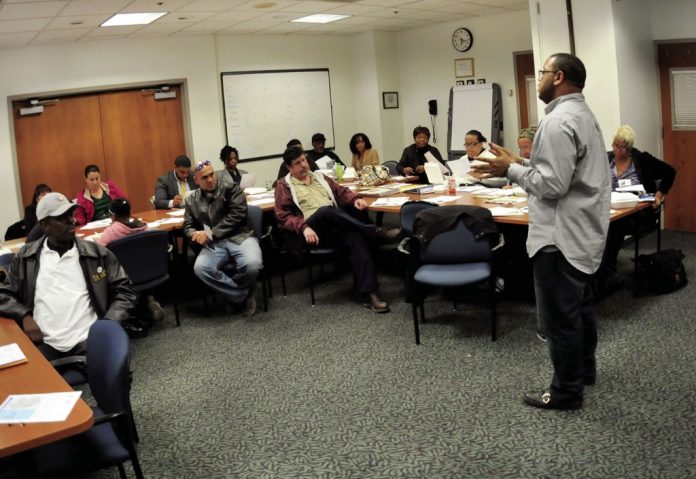Chris Rhametulla, from Pathways PA, explains how to clear up debts and hidden bank fees during a budgeting and money managing presentation at a Northeast EPIC Community Stakeholder Group meeting at Aria Health: Frankford Campus, Thursday, March 29, 2012, Philadelphia, Pa. (Maria Pouchnikova)
If you have lousy credit, you have trouble. Probably more trouble than you know.
Because even if you’re not looking for a loan, or even trying to get a new Visa card, your crummy credit might still cause you a lot of grief.
Maybe even ruin your life.
Think about it. Your credit history isn’t just checked by financial institutions. A landlord who sees bad credit probably won’t rent you that apartment you want, or, he might charge you a higher security deposit. If a hiring choice comes down to you and somebody else who has good credit, guess who’s more likely to get the job? And, if you actually do get a bank loan, you might be charged more by the lending institution than you would if your credit was good.
Bad credit can even affect your ability to get a telephone or an account with a utility company, said Chris Rahemtulla, lead financial educator at non-profit Pathways PA.
“No credit history is not a (as?) big a deal as poor credit history,” he said in an interview.
If you have five or more negative accounts listed on your credit history, many employers are not going to offer you a job, or might rescind an offer when a bad credit history is spotted, he said.
“People don’t know how important credit is and how it can affect every aspect of their lives,” Lyn Kugel, Pathways’ vice president for work force development and self-sufficiency, said.
Rahemtulla, who is based in Delaware County, visited Frankford in February and March to talk about financial health with those attending Northeast EPIC Stakeholder meetings in Aria Health’s Frankford campus.
A lot of people don’t know they have bad credit or about how that bad credit could be affecting their lives, he said. However, even if your credit stinks, there’s good news, Rahemtulla said. You can fix it.
“Bad credit can always become good credit,” he said.
First, anyone can get a free credit report. All three credit-reporting agencies — Experian, Equifax and TransUnion — are required by federal law to give you a report every 12 months. All you have to do is ask for it. It’s free; that’s the law.
Get your report online by going to www.annualcreditreport.com. This is a secure site, Rahemtulla said. You have to fill in your name, address and Social Security number.
Second, each credit report gives you a credit score. The higher the score, the better your credit. Marriage and steady employment build up the score. Lots of things can lower that number. Not paying your bills or paying them late can do it, too. So can defaulting on loans or bankruptcy.
Those who have been unemployed long term, Rahemtulla said, get caught in a spiral. They may have maxed out credit cards and let bills pile up. Since those actions affect their credit and employers want to see good credit, the effects of being unemployed might keep them unemployed, Rahemtulla said.
Lenders are looking for a 680 score or better, he said.
“If you have only a 650, you are going to have to do something to raise that rating,” he said.
Third, you can be a solid bill payer who believes his or her credit should be perfect and still get a rotten credit report, he said, because there might be mistakes. Seven out of 10 credit reports have some inaccurate information on them, Rahemtulla said during a March 29 meeting in Frankford.
Correcting those damaging mistakes is part of what Rahemtulla does at Pathways PA, he said.
“We can get a negative mark removed,” he said. “People usually come to me out of need, because you can’t even open a bank account in some places if you have bad credit.”
If there is inaccurate information on your report, disputes can be filed online, Rahemtulla said. Sometimes, he files for a “goodwill adjustment” if a credit score is damaged by just a few late payments.
The key to building a good credit history, he said, is budgeting and saving.
“We help people put in place strong savings plans,” he said, adding clients are encouraged to put away money for medical bills.
Saving is difficult for anyone who is unemployed. People who are unemployed for one or two years have taken out much of their savings, even hitting their 401(k) retirement plans.
Avoid that if you can, Rahemtulla recommended.
In speaking in Frankford last week, Rahemtulla advised vigilance even if you are saving. Some commercial banks charge fees that catch some customers unaware.
Overdraft fees can be high, and so can ATM charges. Those can run into money, but they’re not as unknown, he said, as “inactivity fees,” which some banks charge if money hasn’t been deposited or withdrawn from an account.
You have to keep your eye on the charges, Rahemtulla said. ••
Money matters . . .
Pathways PA is a non-profit organization that does not charge for its services. It receives federal, state and private foundation funds to help people with financial problems as well as child welfare, work force development and financial self-sufficiency.
Contact lead financial educator Chris Rahemtulla at 800–209–2914 or [email protected]. Visit pathwayspa.org
For your annual credit report, visit www.annualcreditreport.com





